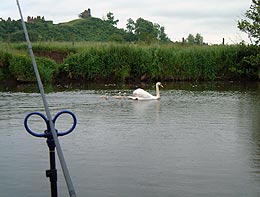Anglers and conservationists have set up a new body to promote the welfare of swans and cut down fishing tackle-related injuries – as a new report reveals birds are still being poisoned by discarded lead shot some 20 years after its use was banned. Officials from the National Federation of Anglers (NFA), the National Convention for the Welfare of Swans and Wildlife and the Environment Agency have teamed up to form the Angling and Swans Liaison Group.
Rescue groups and the RSPCA attend over 8,000 swans in trouble each year and whilst 29 per cent are fishing-related incidents and the biggest single cause of rescues, the survival rate of rescued swans is also very high. Researchers reckon the swan population in England and Wales has increased significantly since the late 1970s – possibly almost doubling. But many mute swans are very tame and are accustomed to being fed bread by members of the public. They frequently approach anglers and, if the opportunity arises, may take the bait and become hooked; a significant number of incidents occur in this way. Other birds become entangled by swimming through fishing line or becoming caught up with lost or discarded tackle. EA fisheries officer Adrian Taylor said: “We’re delighted the study has brought anglers and swan welfare interest groups together to find solutions acceptable to both parties. “Our aim is to see a reduction in the number of reported incidents, without placing undue restrictions on angling. We do not see total bans on angling as solutions for problem sites.” The problem is not spread evenly across all fisheries. Tackle related rescues tend to be concentrated at problem ‘blackspots’. The biggest proportion of angling related rescues occur between July and September in urban areas, during school holidays, where council owned free fishing is not sufficiently managed. The period also coincides with a surge in swan numbers due to the appearance of young, inexperienced cygnets. Ian Epps of the National Federation of Anglers said: “The NFA, along with the other members of the National Angling Alliance have introduced National Coaching Schemes which include modules dealing specifically with environmental issues. “There are in excess of 400 coaches across the country educating anglers of all abilities on the care of wildlife and the countryside. We will press for partnerships between Councils, their local Angling Clubs and the Environment Agency to work together to control Council owned ‘Free’ Fisheries for the benefit of wildlife.” The report also highlights conflicting evidence relating to lead poisoning in swans. The good news is that lead poisoning in swans has fallen substantially since restrictions were introduced in 1987. The bad news is that there are still lead poisoning hotspots, which suggest some anglers are still using illegal lead. The Agency is investigating the lead issue further, with the help of angling and swan interests, and will report on progress in the spring. Peter Martin of the Swan Convention said: “The publication of this report is the culmination of a great deal of hard work by all those involved. It is an important landmark in the efforts of swan rescue groups to improve the environment especially for swans, but also for many other species of wildlife. “The report contains some very uncomfortable facts which demand action be taken, but also it indicates a problem which many believed had been solved in the late 1980’s – lead poisoning. It is still very much with us, and this too must be addressed as a matter of great urgency.”
|
Welcome!Log into your account











